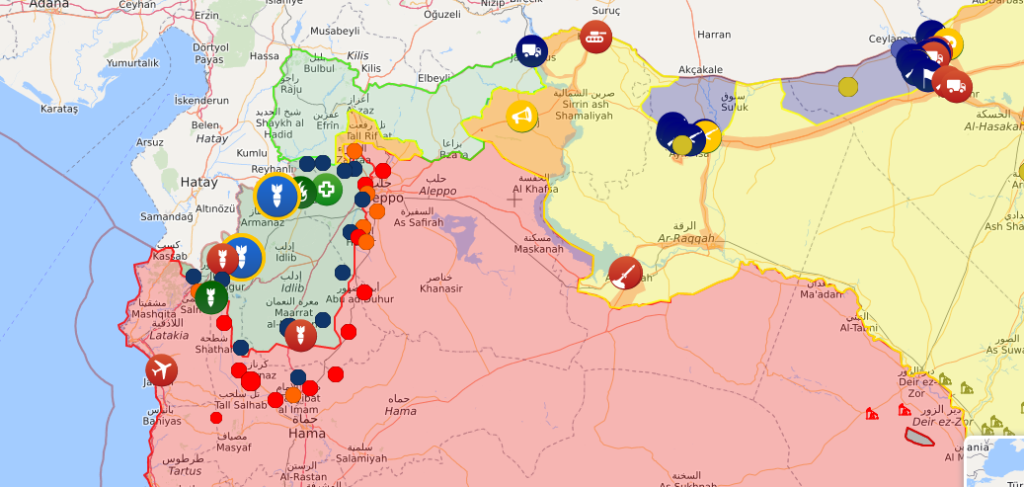Enjoy this roundup of links on the Islamic State in specific, and Syria, Turkey and the Kurds more generally, after Abu Bakr al-Baghdadi’s timely demise:
Abu Bakr al-Baghdadi, the hirsute rapist whom hundreds of thousands of Islamic State supporters considered their absolute leader, died yesterday during a U.S. military raid in northwestern Syria’s Idlib province, President Donald Trump announced on Sunday morning. Baghdadi became the head of ISIS in 2010 but was not seen in public until 2014, when the group designated him caliph and he addressed the world in a florid speech from the pulpit of the al-Nuri mosque in Mosul, Iraq. Since then he has shown himself only once, on a dull video filmed in a windowless room and released in April.
As with Osama bin Laden, the most intriguing fact about Baghdadi’s assassination was its location, deep in what was considered enemy territory. The dominant force in Idlib is not ISIS—which is no longer dominant anywhere—but Hay’at Tahrir al-Sham (HTS), an affiliate of al-Qaeda. Recall that ISIS broke from al-Qaeda in 2013, and since al-Qaeda’s leaders rebuffed Baghdadi’s invitation to bow before him, the groups have traded nonstop insults and their members have tried to kill one another. Some of these insults do not strike me as the type that either side could easily take back: accusations of apostasy, disloyalty, cowardice, and idiocy. For Baghdadi to seek refuge among people who want to kill him probably means that the places where he had more support, such as within his home country of Iraq or near its border with Syria, could no longer provide him with any measure of safety. Finding him in HTS territory is like finding Derek Jeter hiding out in South Boston, or Martin Bormann living quietly by a synagogue on the Upper East Side.
Snip.
Baghdadi was special. By calling for the allegiance of all Muslims—and actually being taken seriously by a large number of them—he accomplished something no previous terrorist leader had done. He channeled, for the masses, a collective sense of connection to a glorious fantasy of an Islamic past. Bin Laden had asked Muslims to rise up in defense of Islam. But his concerns were distinctly 20th-century: overthrowing Arab despotisms, snuffing out the Jewish state, knocking over skyscrapers.
Baghdadi possessed a dramatic vision, one that any Muslim could partake in, that placed himself and anyone brave enough to join him in a line of warriors that extended back to the Prophet Muhammad himself. He noted, ostentatiously, that he hailed from the tribe of Quraish, the Prophet’s own. Historically, Muslims have counted membership in that tribe as one of about half a dozen criteria required of a valid caliph. That criterion had lapsed in importance for literally centuries, with numerous caliphs having no plausible claim to Quraishi ancestry. But Baghdadi claimed that he was a caliph, sensu stricto, in the classical tradition going back to the Abbasids. Furthermore, he would bring back a version of classical Islamic law, including legalized sex slavery and other abominations, in which he partook personally.
And now, like the Abbasids, he is dead—smashed to bits, according to Trump, by a self-detonated suicide vest. (His death was less tidy than that of his immediate Abbasid predecessor, al-Musta’sim Billah, 1213–58. The Mongols who deposed him believed that splattering his blood on the streets of Baghdad would bring bad luck, so they wrapped him in a carpet and stampeded their horses over it until his corpse was nicely tenderized.) Killing al-Musta’sim ended a dynasty. The Islamic State will likely name a successor to continue Baghdadi’s line. But the second caliph of the modern Islamic State will begin his reign in an even more impotent and pathetic state than Baghdadi left it.
When I began speaking with ISIS supporters five years ago, they parroted all the points of propaganda that the group has since made famous. But they included one point that the Islamic State has since de-emphasized. To be a valid caliph, they said, one must have control over territory and implement Islamic law within it. A pledge of allegiance to a caliph (called bay’ah, both classically and by ISIS), they stressed, is a contract, an agreement between parties in which each offers something to the other. The caliph offers an Islamic state; his subject offers obedience. The contract evaporates when the caliph stops providing a state.
Abu Bakr al-Baghdadi has not provided a state for quite a while. Within the Islamic State, members have grumbled that he has been an absentee caliph, gone for months at a time, and not even clear in his instructions about whom to follow in his absence. The group long since stopped promising a paradise, and downgraded its territorial offering to a hellscape soon to be overrun by its enemies. It became ideologically split, with hard-liners accusing others of being softies, and both the softies and the hard-liners trying to kill one another. Baghdadi, it seems, was gone for much of this debate, and provided only vague guidance and little in the way of security or leadership. Some former supporters have felt abandoned, and have voiced their disgust.
His death will therefore definitively end an era that had already, in a sense, ended, if not with a whimper then with an inglorious bleating of complaints from his own flock. For years now, the hardest thing for outsiders to understand about the Islamic State has been its ability to inspire—to get some Muslims to leave comfortable circumstances to fight and die. For the past year, even as the world has diverted its attention from ISIS, the group’s ability to inspire has been severely diminished, and almost no one is leaving home to die for ISIS, or choosing to die in suicide attacks for ISIS at home. The inspiration is gone, and the party is over, for now. And although Baghdadi has obtained the martyrdom he sought, he got it in the end not as a caliph but as just another bloody hairball in a pile of rubble.
Legacy media outlets responded to President Trump’s announcement of the U.S. military’s successful mission against ISIS leader Abu Bakr al-Baghdadi with their trademark hostility and anger. That’s because the inarguably good news threatens corporate media goals for shaping foreign policy, impeaching the president, and defeating Trump in 2020.
Snip.
Corporate media have moved from at least projecting concern for reporting the actual news into unembarrassed political actors. That enables them to flamboyantly spin — as opposed to their previous method of subtly spinning — even major news with indisputable facts.
The 2016 campaign was a humiliating defeat for Hillary Clinton, but also for political media. Media outlets never understood the electorate they were paid big dollars to write and broadcast news about. They confidently asserted Trump had no chance to win, and convinced themselves that casting off journalistic standards was defensible because of the certain ruin Trump would bring.
Instead, President Trump’s administration has been marked by success in the domestic and foreign spheres. The economy is humming, including job and wage growth the media had previously said was unlikely to impossible to achieve. This is due to tax cuts, tax reform, and unprecedented deregulation. No new wars have been launched, much less the apocalyptic nuclear wars the media predicted. A long overdue recalibration with China is taking place.
What is good news for the country is bad news for the media and their political allies.
One of the tools they can utilize in their war on the president is to deny him honest media coverage of his successes, making it more difficult to clip news of them discussing those successes in an honest fashion. It’s not a conspiracy so much as a shared mindset that kicked into action this weekend.
Snip.
Trump Foreign Policy Successes Undermine Media Impeachment Drive
The biggest champions of impeachment are the media, seeking to save face after their 2016 and Russia collusion hoax failures. They have all but forced the Democrats to launch the proceedings even though their path is fraught with difficulties.
Yesterday’s Sunday Morning shows — no matter the outlet or the particular host — were all scheduled to throw more fuel on the impeachment fire. Instead, they were forced to cover a major success in the battle to defeat the Islamic State.
Impeaching the president who oversaw the operation looks even worse than just impeaching the president who has survived a non-stop, years-long campaign from the media, Democrats, and other Resistance members. For impeachment to have any chance of survival, the media need to both downplay and move quickly from the story back to their uncritical repetition of Democratic Party talking points.


